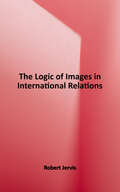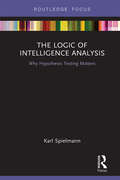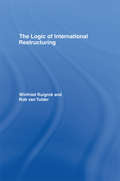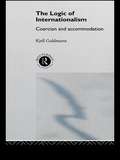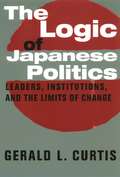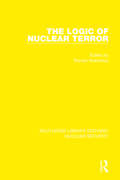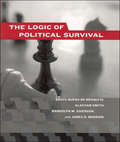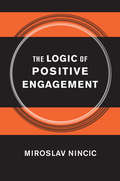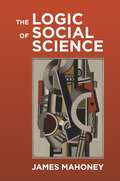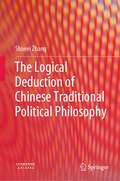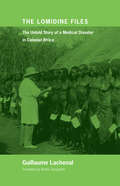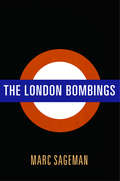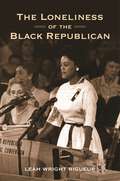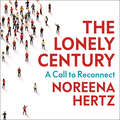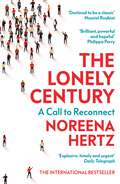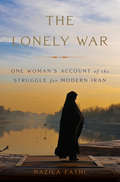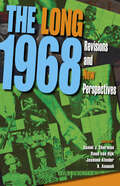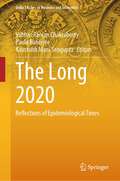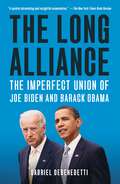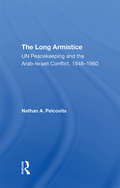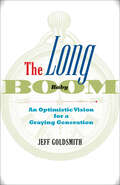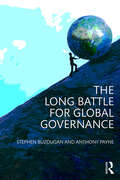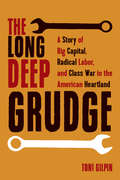- Table View
- List View
The Logic of Images in International Relations
by Robert JervisThe subject of this book is a little-discussed aspect of international politics, the ways states can affect the images others have of them and thereby exercise influence without paying the high cost of altering their own major policies. Military and economic resources, the main instrumentalities of power, have been widely studied. Less has been written about the role of diplomatic skill, and the authors of this literature have rarely focused on the full range of techniques by which a state can influence the inferences others are making about it and have not explored in any detail the ways desired images, which may be accurate or inaccurate, not only supplement the more usual forms of power but are indispensable for reaching certain goals.
The Logic of Intelligence Analysis: Why Hypothesis Testing Matters
by Karl SpielmannThis book discusses the application of hypothesis testing to the practice of intelligence analysis. By drawing on longstanding procedures of scientific method, particularly hypothesis testing, this book strongly critiques standard intelligence analytic practices. It shows these practices to be inadequate, as they are illogical in terms of what formal philosophy says any intelligence analysts can realistically be expected to know, and for the future when analysts will face pressures to adapt to digital age modeling techniques. The methodology focuses on identifying and remedying analytic errors caused by analyst cognitive biases and by foreign denial and deception. To demonstrate that it is a practical tool, it walks analysts through a case study, step by step, to show how its hypothesis testing can be implemented. It also invites a comparative test in the real world with any other intelligence methodologies to assess its strengths and weaknesses in predicting the outcome of an actual "live" intelligence issue. This book will be of much interest to students of intelligence studies, public policy and national security, as well as practitioners.
The Logic of International Restructuring: The Management of Dependencies in Rival Industrial Complexes
by Winfried Ruigrok Rob van TulderThere is within the corporate world an evolving international restructuring race,between industrial complexes,that is set to intensify over the coming years.An industrial complex consists of suppliers,distributors,governments,financiers and trade unions.It is the reorganisation of the relationship between the core firm and the above components that is set to change before very long.In this book, Winfied Ruigrok and Rob van Tulder address many current debates on topics such as "Post-Fordism","globalisation" and "lean production".They also identify a number pf rival internationalisation strategies that have been adopted by different companies.Moreover,they present an abundance of new,as well as historical data,on the world's one hundred largest core companies.This data shows that none of the largest core firms is truly "global" or "borderless",and that virtually all of them in their history have benefited decisively from Governmental trade or industrial policies.The authors offer a highly interdisciplinary effort to link three previously isolated debates on industrial restructuring,globalisation and international trade policies.The Logic of International Restructuring is aimed at a wide academic,post-graduate and professional audience working in the areas of business,economics,organisational studies and international relations.
The Logic of Internationalism: Coercion and Accommodation (New International Relations)
by Kjell GoldmannInternationalism is the view that institution-building and peaceful cooperation will make peace and security prevail in a system of independent states. This book examines this controversial topic and discusses whether such a view is realistic or whether international relations are typically characterised by tension and war.Kjell Goldmann seeks to examine the plausibility of internationalism under present-day conditions. A theory of internationalism is outlined and is shown to have two dimensions: one coercive (to enforce the rules and decisions of international institutions) and one accommodative (to avoid confrontation by means of mutual understanding and compromise). Problematic features of the theory are then considered in detail: the assumption that all international cooperation tends to inhibit war, and the tension inherent in the joint pursuit of coercion and accommodation.
The Logic of Japanese Politics: Leaders, Institutions, and the Limits of Change (Studies of the Weatherhead East Asian Institute, Columbia University)
by Gerald CurtisWidely recognized both in America and Japan for his insider knowledge and penetrating analyses of Japanese politics, Gerald Curtis is the political analyst best positioned to explore the complexities of the Japanese political scene today. Curtis has personally known most of the key players in Japanese politics for more than thirty years, and he draws on their candid comments to provide invaluable and graphic insights into the world of Japanese politics. By relating the behavior of Japanese political leaders to the institutions within which they must operate, Curtis makes sense out of what others have regarded as enigmatic or illogical. He utilizes his skills as a scholar and his knowledge of the inner workings of the Japanese political system to highlight the commonalities of Japanese and Western political practices while at the same time explaining what sets Japan apart.Curtis rejects the notion that cultural distinctiveness and consensus are the defining elements of Japan's political decision making, emphasizing instead the competition among and the profound influence of individuals operating within particular institutional contexts on the development of Japan's politics. The discussions featured here—as they survey both the detailed events and the broad structures shaping the mercurial Japanese political scene of the 1990s—draw on extensive conversations with virtually all of the decade's political leaders and focus on the interactions among specific politicians as they struggle for political power.The Logic of Japanese Politics covers such important political developments as the Liberal Democratic Party's egress from power in 1993, after reigning for nearly four decades, and their crushing defeat in the "voters' revolt" of the 1998 upper-house election; the formation of the 1993 seven party coalition government led by prime minister Morihiro Hosokawa and its collapse eight months later; the historic electoral reform of 1994 which replaced the electoral system operative since the adoption of universal manhood suffrage in 1925; and the decline of machine politics and the rise of the mutohaso—the floating, nonparty voter.Scrutinizing and interpreting a complex and changing political system, this multi-layered chronicle reveals the dynamics of democracy at work—Japanese-style. In the process, The Logic of Japanese Politics not only offers a fascinating picture of Japanese politics and politicians but also provides a framework for understanding Japan's attempts to surmount its present problems, and helps readers gain insight into Japan's future.
The Logic of Nuclear Terror (Routledge Library Editions: Nuclear Security)
by Roman KolkowiczOriginally published in 1987, The Logic of Nuclear Terror presented a much-needed critical review of the premises, concepts, and policy prescriptions of deterrence theories and doctrines at the time. In particular, authors address: the historical validity, theoretical vitality, and policy-relevance of nuclear deterrence theories and doctrines; the ways in which technological and political change have affected the original concepts of nuclear war and deterrence strategies, and the ways in which such changes have affected policy and doctrine; and realistic alternative ways of thinking about strategy in the changing context of new military technologies and international politics. The outstanding group of international contributors to this volume include both proponents and critics of current doctrine. The result is an unusually well-balanced and unique contribution to our understanding of nuclear deterrence theory and practice. As such, it will be of interest to students, policymakers, and teachers of international relations, defense and foreign policy, US-Soviet relations, and arms control and disarmament.
The Logic of Political Survival (The\mit Press Ser.)
by Alastair Smith James D. Morrow Bruce Bueno De Mesquita Randolph M. SiversonThe authors of this ambitious book address a fundamental political question: why are leaders who produce peace and prosperity turned out of office while those who preside over corruption, war, and misery endure? Considering this political puzzle, they also answer the related economic question of why some countries experience successful economic development and others do not. The authors construct a provocative theory on the selection of leaders and present specific formal models from which their central claims can be deduced. They show how political leaders allocate resources and how institutions for selecting leaders create incentives for leaders to pursue good and bad public policy. They also extend the model to explain the consequences of war on political survival. Throughout the book, they provide illustrations from history, ranging from ancient Sparta to Vichy France, and test the model against statistics gathered from cross-national data. The authors explain the political intuition underlying their theory in nontechnical language, reserving formal proofs for chapter appendixes. They conclude by presenting policy prescriptions based on what has been demonstrated theoretically and empirically.
The Logic of Positive Engagement (Cornell Studies in Security Affairs)
by Miroslav NincicRecent American foreign policy has depended heavily on the use of negative inducements to alter the behavior of other states. From public browbeating through economic sanctions to military invasion, the last several presidents have chosen to use coercion to advance U.S. interests when dealing with adversaries. In this respect, as Miroslav Nincic notes, the United States differs from many of its closest allies: Canada has long maintained diplomatic relations with Cuba, and several of the European democracies have continued diplomatic engagement with governments that the United States considers pariah regimes. In The Logic of Positive Engagement, Nincic outlines the efficacy of and the benefits that can flow from positive rather than negative engagement.Nincic observes that threats and punishments may be gratifying in a symbolic sense, but that they haven't affected the longevity or the most objectionable policies of the regimes against which they are directed. Might positive inducements produce better results? Nincic examines two major models of positive inducements: the exchange model, in which incentives are offered in trade for altered behavior, and the catalytic model, in which incentives accumulate to provoke a thorough revision of the target's policies and priorities. He examines the record with regard to long-term U.S. relations with Cuba, Libya, and Syria, and then discusses the possibility that positive inducements might bring policy success to current relations with Iran and North Korea.
The Logic of Social Science
by James MahoneyA groundbreaking logic-based approach to bridging the scientific-constructivist divide in social scienceThe Logic of Social Science offers new principles for designing and conducting social science research. James Mahoney uses set-theoretic analysis to develop a fresh scientific constructivist approach that avoids essentialist biases in the production of knowledge. This approach recognizes that social categories depend on collective understandings for their existence, but it insists that this recognition need not hinder the use of explicit procedures for the rational assessment of truth. Mahoney shows why set-theoretic analysis enables scholars to avoid the pitfalls of essentialism and produce findings that rest on a firm scientific foundation.Extending his previous work and incorporating new material, Mahoney presents specific tools for formulating and evaluating theories in the social sciences. Chapters include discussions of models of causality, procedures for testing propositions, tools for conducting counterfactual and sequence analysis, and principles for knowledge accumulation. Equal focus is placed on theory building and explanatory tools, including principles for working with general theoretical orientations and normative frameworks in scientific research. Mahoney brings a novel perspective to understanding the relationship among actors, social rules, and social resources, and he offers original ideas for the analysis of temporality, critical events, and path dependence.Bridging the rift between those who take a scientific approach and those who take a constructivist one, The Logic of Social Science forges an ambitious way forward for social science researchers.
The Logical Deduction of Chinese Traditional Political Philosophy
by Shiwei ZhangThis book presents a panoramic and extensive exploration of Chinese political philosophy, examining key political problems of the past, and the thinkers who addressed them. As the reader will discover, China’s traditional political philosophy is one with distinctive national characteristics and ideals. Therefore, the book helps to clarify the evolution of Chinese political thought, while also investigating fundamental political issues throughout the country’s history. The book offers a unique resource for researchers and graduate students in the fields of political science, philosophy, and history, as well as ordinary readers who are interested in China’s traditional and political culture.
The Lomidine Files: The Untold Story of a Medical Disaster in Colonial Africa
by Guillaume LachenalTracing the nightmarish effects of the "wonder drug" Lomidine in preventing sleeping sickness in Africa.Winner of the George Rosen Prize by the American Association for the History of MedicineAfter the Second World War, French colonial health services, armed with a newly discovered drug, made the eradication of sleeping sickness their top priority. A single injection of Lomidine (known as Pentamidine in the United States) promised to protect against infection for six months or longer. Mass campaigns of "preventive lomidinization" were launched with immense enthusiasm across Africa. But the drug proved to be both inefficient and dangerous. Contaminated injections caused bacterial infections that progressed to gangrene, killing dozens of people. Shockingly, the French physicians who administered the shots seemed to know the drug’s risk: while they obtained signed consent before giving Lomidine to French citizens, they administered it to Africans without their consent—sometimes by force.In The Lomidine Files, Guillaume Lachenal traces the medicine’s trajectory from experimental trials during the Second World War, when it was introduced as a miracle cure for sleeping sickness, to its abandonment in the late 1950s, when a series of deadly incidents brought lomidinization campaigns to a grinding halt. He explores colonial doctors’ dangerously hubristic obsession with an Africa freed from disease and describes the terrible reactions caused by the drug, the resulting panic of colonial authorities, and the decades-long cover-up that followed.A fascinating material history that touches on the drug’s manufacture and distribution, as well as the tragedies that followed in its path, The Lomidine Files resurrects a nearly forgotten scandal. Ultimately, it illuminates public health not only as a showcase of colonial humanism and a tool of control but also as an arena of mediocrity, powerlessness, and stupidity.
The Lomidine Files: The Untold Story of a Medical Disaster in Colonial Africa
by Guillaume LachenalThis prize-winning study examines the nightmarish effects of the so-called “wonder drug” in preventing sleeping sickness in Africa.After the Second World War, French colonial health services set out to eradicate sleeping sickness in Africa. The newly discovered drug Lomidine (also known as Pentamidine) promised to protect against infection, and mass campaigns of “preventive lomidinization” were launched across Africa. But the drug proved to be both inefficient and dangerous. In numerous cases, it led to fatality.In The Lomidine Files, Guillaume Lachenal traces the medicine’s trajectory from experimental trials during the Second World War to its abandonment in the late 1950s. He explores colonial doctors’ dangerous obsession with an Africa freed from disease and describes the terrible reactions caused by the drug, the resulting panic of colonial authorities, and the decades-long cover-up that followed.A fascinating material history that touches on the drug’s manufacture and distribution, as well as the tragedies that followed in its path, The Lomidine Files resurrects a nearly forgotten scandal. Ultimately, it illuminates public health not only as a showcase of colonial humanism and a tool of control but also as an arena of mediocrity, powerlessness, and stupidity.Winner of the George Rosen Prize by the American Association for the History of Medicine
The London Bombings
by Marc SagemanOn July 7, 2005, at the end of the morning rush hour, three near-simultaneous explosions tore apart the London Underground. Within an hour, the entire subway network was evacuated, and a fourth explosion in a bus underscored that this was a terrorist operation. The bombings shattered the British counterterrorism services' assumptions about the global neojihadi threat to Britain. <P><P>Authorities pondered whether al Qaeda was a loose coalition with no clear leadership or a highly structured group with international reach that posed a clear threat to the United Kingdom. These two perspectives are not just academic disputes but raise important issues with real consequences in terms of counterterrorism strategy. What sorts of distinct measures are needed to combat these opposing forms of terrorism? What can we learn from the ways in which the London terror attacks were planned and executed—and from Britain's response? <P><P>In The London Bombings, counterterrorism expert Marc Sageman seeks to answer these questions through a new detailed account and analysis of the Underground bombings as well as three other attacks directed at Britain between 2004 and 2006. <P><P>Drawing on previously unavailable trial transcripts and law enforcement records, terrorists' self-documentation, and his own government experience in counterterrorism, Sageman makes the case that "top down" and "bottom up" conceptions of terror organizations need not be incompatible and that, in part because of this binary thinking, the West has tended to overreact to the severity of the threat. He stresses the fluid, chaotic ways that terrorist events unfold: spontaneously and gradually with haphazard planning—as the perpetrators are often worldly, educated, and not particularly religious before becoming engaged in neojihadi activities. <P><P>The London Bombings is a vital, persuasive account of events that have not yet been properly presented to the public and are critical to the foundation of an effective counterterrorism strategy.
The Loneliness of the Black Republican: Pragmatic Politics and the Pursuit of Power (Politics and Society in Modern America #122)
by Leah Wright RigueurThe story of black conservatives in the Republican Party from the New Deal to Ronald ReaganCovering more than four decades of American social and political history, The Loneliness of the Black Republican examines the ideas and actions of black Republican activists, officials, and politicians, from the era of the New Deal to Ronald Reagan's presidential ascent in 1980. Their unique stories reveal African Americans fighting for an alternative economic and civil rights movement—even as the Republican Party appeared increasingly hostile to that very idea. Black party members attempted to influence the direction of conservatism—not to destroy it, but rather to expand the ideology to include black needs and interests.As racial minorities in their political party and as political minorities within their community, black Republicans occupied an irreconcilable position—they were shunned by African American communities and subordinated by the GOP. In response, black Republicans vocally, and at times viciously, critiqued members of their race and party, in an effort to shape the attitudes and public images of black citizens and the GOP. And yet, there was also a measure of irony to black Republicans' "loneliness": at various points, factions of the Republican Party, such as the Nixon administration, instituted some of the policies and programs offered by black party members. What's more, black Republican initiatives, such as the fair housing legislation of senator Edward Brooke, sometimes garnered support from outside the Republican Party, especially among the black press, Democratic officials, and constituents of all races. Moving beyond traditional liberalism and conservatism, black Republicans sought to address African American racial experiences in a distinctly Republican way.The Loneliness of the Black Republican provides a new understanding of the interaction between African Americans and the Republican Party, and the seemingly incongruous intersection of civil rights and American conservatism.
The Lonely Century: A Call to Reconnect
by Noreena Hertz'Indispensable, engaging and brilliant book about the pervasiveness of loneliness in the twenty-first century and its far-reaching impact...a hopeful book that couldn't be more important or timely.' Philippa Perry, author of The Book You Wish Your Parents Had ReadEven before a global pandemic introduced us to terms like social distancing, loneliness was already becoming the defining condition of the twenty-first century.'Fascinating, timely and important...Read it, then pass it on to a friend. If you can find one.' Charlie BrookerCarl, the Los Angeles media executive so lonely he pays to be cuddled. Eric, the Parisian baker finding community in the political far right. Peter, the London schoolboy distraught because no one 'likes' his Instagram posts.All around us, the fabric of community is unravelling and our personal relationships are under threat. And technology isn't the sole culprit; equally to blame are the dismantling of civic institutions, the radical reorganisation of the workplace, mass migration to cities, and decades of neoliberal policies that placed self-interest above the collective good.'Passionately argued and deeply researched, this book is for everyone who wants to build a healthier and more connected world.' Arianna HuffingtonThis is not merely a mental health crisis. Loneliness increases our risk of heart disease, cancer and dementia. Statistically, it's as bad for our health as smoking fifteen cigarettes a day. It's also an economic crisis, costing us billions annually, and a political crisis, with feelings of marginalisation fuelling divisiveness and extremism around the world.But it's also one we have the power to reverse. Combining a decade of research with first-hand reporting, Noreena Hertz takes us from a 'how to communicate in real life' class at an Ivy League university to encounters in German beer gardens between people with radically different political views, from 'renting a friend' in Manhattan to nursing home residents knitting bonnets for their robot caregivers in Japan.Offering bold solutions ranging from compassionate AI to innovative models for urban living to new ways of reinvigorating our neighbourhoods and reconciling our differences, The Lonely Century offers a hopeful and empowering vision for how to heal our fractured communities and restore connection in our lives.(P) 2020 Hodder & Stoughton Ltd
The Lonely Century: A Call to Reconnect
by Noreena Hertz'If I could issue a reading list to 10 Downing Street, I'd put this book near the top.' Guardian 'Destined to be a classic' Nouriel Roubini'Fascinating' Sathnam Sanghera, The Times'A hopeful book that couldn't be more important or timely' Philippa Perry 'Timely and important' Charlie BrookerA hopeful and empowering vision for how to reconnect with each other and heal our divides.Even before a global pandemic introduced us to terms like social distancing, loneliness was already becoming the defining condition of the twenty-first century. But it's also one we have the power to reverse. Combining a decade of research with first-hand reporting, Noreena Hertz takes us from a 'how to communicate in real life' class for smartphone-addicted university students to bouncy castles at Belgian far-right gatherings, from 'renting a friend' and paying for cuddles in the U.S. to nursing home residents knitting bonnets for their robot caregivers in Japan.Packed with bold solutions that we can apply at home, at work and in our neighbourhoods, and with a clear vision for what businesses and governments must do, she explores how our increasing dependence on technology, radical changes to the workplace and decades of policies that have placed self-interest above the collective good, are making us more isolated than ever before.Noreena Hertz helps us to understand why this is the lonely century, how we got here and what each of us can do to help reduce loneliness for ourselves and our communities.
The Lonely War: One Woman's Account of the Struggle for Modern Iran
by Nazila FathiAs a nine-year-old Tehrani schoolgirl during the Iranian Revolution, Nazila Fathi watched her country change before her eyes. The revolutionaries--most of them poor, uneducated, and radicalized--seized jobs, housing, and positions of power, transforming Iranian society practically overnight. But this socioeconomic revolution had an unintended effect. As Fathi shows, the forces unleashed in 1979 inadvertently created a robust Iranian middle class, one that today hungers for more personal freedoms and a renewed relationship with the outside world. And unless an international confrontation allows Iranian leaders to justify an internal crackdown, this internal pressure for reform will soon set the country on a more stable track. In The Lonely War, Fathi describes Iran’s awakening alongside her own, revealing how moderates are retaking the country--and how foreign powers can aid their progress.
The Long 1968: Revisions and New Perspectives
by A. Aneesh Jasmine Alinder Daniel J. Sherman Ruud Van DijkDelving into a tumultuous year’s impact on art, culture, and politics, this book “illuminates the often-overlooked histories of 1968” (The Journal of American History).From the mid-1960s to the early 1970s, revolutions in theory, politics, and cultural experimentation swept around the world. These changes had as great a transformative impact on the right as on the left.A touchstone for activists, artists, and theorists of all stripes, the year 1968 has taken on new significance for the present moment, which bears certain uncanny resemblances to that time. The Long 1968 explores the wide-ranging impact of the year and its aftermath in politics, theory, the arts, and international relations—and its uses today.
The Long 2020: Reflections of Epidemiological Times (India Studies in Business and Economics)
by Kaustubh Mani Sengupta Paula Banerjee Subhas Ranjan ChakrabortyThis book looks at the current crises of life and livelihood following the global epidemiological crisis and various strategies to manage them as a long unfolding of past trends and future possibilities of epidemiological governance, restructuring of global economy, public health, systems of protection and care and the role of state in that, and precarities of the migrants and the refugees. It brings together scholars from different fields to think of our present in the time of COVID-19 pandemic in a longer temporal frame. The essays compiled in this book investigate issues mentioned above, covering a period from the colonial past to the postcolonial present with an aim towards encouraging scholarly debates on protection, care and justice. Although the experiences of last two years have inspired some very important academic and scholarly interventions, this book compiles original research to contextualise the present in a longue duree framework and arrive at a more complex understanding of it. It is a must-have resource for researchers of developmental studies especially in the above mentioned areas, as well as policy makers, think tanks and other non-governmental organizations interested in these areas.
The Long Alliance: The Imperfect Union of Joe Biden and Barack Obama
by Gabriel DebenedettiNew York Magazine national correspondent Gabriel Debenedetti reveals an inside look at the historically close, complicated, occasionally co-dependent, and at-times uncertain relationship between Joe Biden and Barack Obama.Delving far deeper than the simplistic “bromance” narrative that’s long held the public eye, The Long Alliance reveals the past, present, and future of the unusual partnership, detailing its development, its twists and turns, its ruptures and reunions, and its path to this pivotal moment for each man’s legacy.The true story of this relationship, from 2003 into 2022, is significantly more layered and consequential than is widely understood. The original mismatch between the veteran Washington traditionalist and the once-in-a-generation outsider has transformed repeatedly in ways that have molded not just four different presidential campaigns and two different political parties, but also wars, a devastating near-depression, movements for social equality, and the fight for the future of American democracy. The bond between them has been, at various times over the past two decades, tense, affectionate, nonexistent, and ironclad — but it has always been surprising. Now it is shaping a second presidential administration, and the future of the world as we know it.
The Long Armistice: Un Peacekeeping And The Arab-israeli Conflict, 1948-1960
by Nathan A PelcovitsDrawing on previously untapped documents, interviews with key actors, and his own experiences in the Department of State, Nathan Pelcovits takes a fresh look at the impact of UN intervention, as peacekeeper and peacemaker, on the Arab-Israeli conflict during the formative years between 1948 and 1960. He examines the reasons behind the UN assumption of a quasi-custodial role in the dispute and how it is that Israel and the Arab states have come to hold diametrically opposed views of the value of engaging the UN as intermediary, with the UN-Israel relationship cooling into one of mutual suspicion and mistrust. Most relevant to the current peace process, Pelcovits explains why UN action shifted early in the game from an ambitious effort at peaceful settlement to "keeping" the peace of a long armistice. Pelcovits argues that the wounds of the formative years have affected the dynamic of the peace process to this day. The UN has been accorded a marginal role in the negotiations—ceremonial and passive—and UN peacekeepers are not likely to be enlisted as guarantors of the settlement.
The Long Baby Boom: An Optimistic Vision for a Graying Generation
by Jeff GoldsmithIn 2006, the first baby boomers turned 60, unleashing a veritable tidal wave of gloomy punditry, advertising for financial services, and forecasts of impending national bankruptcy. In The Long Baby Boom, Jeff Goldsmith counters the predictions of such "catastropharians" with a far more optimistic scenario.Drawing on evidence that most baby boomers plan on working long past age 65, Goldsmith argues that they will have a constructive impact on society over the next twenty years. By assuming a much larger portion of the financial burden of their own retirement and health costs, they will help preserve Social Security and Medicare for the less fortunate and for successive generations.The Long Baby Boom is the first comprehensive forecast of baby boomers’ career plans, health trends, and cultural and political values. Goldsmith's pro-work, pro-savings, pro-health social policy emphasizes personal responsibility without ripping the social safety net. Optimistic and innovative, The Long Baby Boom doesn't promise a cloud-free future, but it does reassure us that the sky isn't falling.
The Long Baby Boom: An Optimistic Vision for a Graying Generation
by Jeff Goldsmith“Important, timely . . . should be the basis for a national debate about how we each want to grow older and what kind of society we want to do it in.” —John Rother, Group Executive Officer of Policy and Strategy, AARPThe aging of the boomer generation has unleashed a veritable tidal wave of gloomy punditry, advertising for financial services, and forecasts of impending national bankruptcy. In The Long Baby Boom, Jeff Goldsmith counters the catastrophic predictions with a far more optimistic scenario.Drawing on evidence that most baby boomers plan on working long past age sixty-five, Goldsmith argues that they will have a constructive impact on society. By assuming a much larger portion of the financial burden of their own retirement and health costs, they will help preserve Social Security and Medicare for the less fortunate—and for successive generations.The Long Baby Boom is the first comprehensive forecast of baby boomers’ career plans, health trends, and cultural and political values. Goldsmith’s pro-work, pro-savings, pro-health social policy emphasizes personal responsibility without ripping the social safety net. Constructive and innovative, The Long Baby Boom doesn’t promise a cloud-free future, but it does reassure us that the sky isn’t falling.
The Long Battle for Global Governance
by Anthony Payne Stephen BuzduganThe Long Battle for Global Governance charts the manner in which largely excluded countries, variously described as ‘ex-colonial’, ‘underdeveloped’, ‘developing’, ‘Third World’ and lately ‘emerging’, have challenged their relationship with the dominant centres of power and major institutions of global governance across each decade from the 1940s to the present. The book offers a fresh perspective on global governance by focusing in particular on the ways in which these countries have organised themselves politically, the demands they have articulated and the responses that have been offered to them through all the key periods in the history of modern global governance. It re-tells this story in a different way and, in so doing, describes and analyses the current rise to a new prominence within several key global institutions, notably the G20, of countries such as Brazil, China, India and South Africa. It sets this important political shift against the wider history of longstanding tensions in global politics and political economy between so-called ‘Northern’ and ‘Southern’ countries. Providing a comprehensive account of the key moments of change and contestation within leading international organisations and in global governance generally since the end of the Second World War, this book will be of great interest to scholars, students and policymakers interested in politics and international relations, international political economy, development and international organisations.
The Long Deep Grudge: A Story of Big Capital, Radical Labor, and Class War in the American Heartland
by Toni Gilpin&“The definitive history of an important but largely forgotten labor organization and its heroic struggles with an icon of industrial capitalism.&” —Ahmed A. White, author of The Last Great Strike This rich history details the bitter, deep-rooted conflict between industrial behemoth International Harvester and the uniquely radical Farm Equipment Workers union. The Long Deep Grudge makes clear that class warfare has been, and remains, integral to the American experience, providing up-close-and-personal and long-view perspectives from both sides of the battle lines. International Harvester—and the McCormick family that largely controlled it—garnered a reputation for bare-knuckled union-busting in the 1880s, but in the twentieth century also pioneered sophisticated union-avoidance techniques that have since become standard corporate practice. On the other side the militant Farm Equipment Workers union, connected to the Communist Party, mounted a vociferous challenge to the cooperative ethos that came to define the American labor movement after World War II. This evocative account, stretching back to the nineteenth century and carried through to the present, reads like a novel. Biographical sketches of McCormick family members, union officials and rank-and-file workers are woven into the narrative, along with anarchists, jazz musicians, Wall Street financiers, civil rights crusaders, and mob lawyers. It touches on pivotal moments and movements as wide-ranging as the Haymarket &“riot,&” the Flint sit-down strikes, the Memorial Day Massacre, the McCarthy-era anti-communist purges, and America&’s late twentieth-century industrial decline. &“A capitalist family dynasty, a radical union, and a revolution in how and where work gets done—Toni Gilpin&’s The Long Deep Grudge is a detailed chronicle of one of the most active battlefronts in our ever-evolving class war.&” —John Sayles
